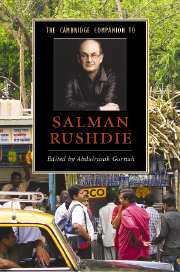3 - Salman Rushdie and the English tradition
from Part I: - Themes and Issues
Published online by Cambridge University Press: 28 November 2007
Summary
At the turn of the millennium, Salman Rushdie left London, his home for the previous thirty years, for New York, declaring the English literary scene to be bitchy, insular and smug. The move was portrayed in some quarters as a desertion of the country that had sheltered him during the dark years of the Ayatollah Khomeini's fatwa, with the popular press particularly acerbic in some of its comments. Even the liberal broadsheet newspaper the Guardian joined the personalised attacks, merging Rushdie's complex private life with the plot of his ill-received 2001 novel Fury in a spoof 'condensed account' of the novel: 'Self-regarding fiftysomething man dumps his wife, moves to New York, meets the most beautiful woman in the world and writes about it.'
As the latest in a long line of controversies accompanying the author, the storm over Rushdie's relocation might serve as anecdotal evidence of the fraught relationship between the writer and the British cultural establishment, and as an instance of the inherent difficulty of placing Rushdie in relation to Britishness in general, and the English literary tradition in particular. Moreover, attempting to characterise 'the English tradition' itself is an exercise beset with snares. Looking back into the recent history of literary criticism the picture appears to have been clearer, at least to cultural conservatives. Writing in an essay entitled, 'The Englishness of the English Novel' (1981), Q. D. Leavis - with enviable certainty - described an 'instinctive national preference' leading to a 'demand on creative writers for inwardness, understanding, and the Shakespearian “fullness of life”': something which was, for her, attainable only when English authors chose 'to write from their roots'.
- Type
- Chapter
- Information
- The Cambridge Companion to Salman Rushdie , pp. 29 - 44Publisher: Cambridge University PressPrint publication year: 2007

